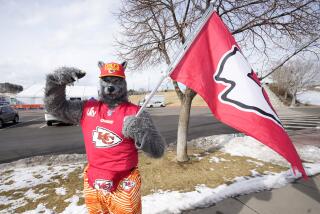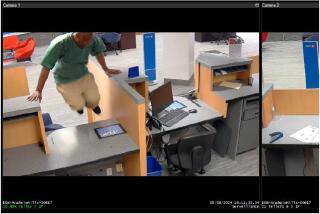Remorseful Bank Robber Gets 9 Years
Expressing remorse and promising to turn his life around, one of Southern California’s most notorious bank robbers was sentenced to nine years in prison Thursday by a federal judge in Los Angeles.
Cain Vincent Dyer, 31, a decorated Marine veteran turned drug addict, was believed responsible for as many as 24 bank robberies throughout Southern California.
Nicknamed the Kangaroo Bandit because he stuffed his loot into a backpack strapped to his chest, Dyer surrendered to the FBI a year ago and, in a deal with prosecutors, pleaded guilty to six robberies.
U.S. District Judge Gary A. Feess, who handed down the sentence, ordered Dyer to pay $476,093 in restitution and placed him on five years of supervised release.
Dyer, who is married and has three children, said he began robbing banks in 1999 not just to satisfy his drug habit but because he owed a large amount of money to criminals who were threatening to kill him and his family.
“I know that doesn’t justify what I did,” he told Feess. “But I was put in a horrible situation.”
Over a 19-month period, Dyer hit about two dozen banks in Los Angeles, Orange, Ventura and San Diego counties.
Armed with a handgun, he would order customers to lie on the floor and then went from teller to teller, scooping cash across the counter into his backpack.
Typically, a lone robber will slip a demand note to a teller or ask for money quietly to attract as little attention as possible. The Kangaroo Bandit was brazenly aggressive, however. Flashing his gun and shouting obscenities, he struck fear into customers and tellers alike.
Although security cameras caught the robber on videotape, he was not easy to identify.
He usually wore dark glasses and a baseball cap to shield his face. Witnesses could not agree on whether he was black, white or Latino. Dyer is of mixed race.
After months of investigation, the FBI appealed to the public for help, offering a $15,000 reward and arranging for the case to be publicized on television’s “America’s Most Wanted.”
But ultimately, it was Dyer who turned himself in at the FBI’s field office in Westwood with the assistance of criminal defense lawyer Winston K. McKesson.
Flanked by his attorney Thursday, Dyer told Feess that he once rationalized robbing banks as a “victimless crime.” Since then, he said, he has come to realize that he traumatized many innocent bank employees and customers. He said he wished he could contact them and apologize face to face.
Feess and Assistant U.S. Atty. Cheryl Murphy both commended the defendant for his expression of remorse.
“Unlike a lot of people who appear before me for sentencing,” said the judge, “I think he is sincere.”
Feess invited Dyer to stop by his chambers for a chat after his release.
More to Read
Sign up for Essential California
The most important California stories and recommendations in your inbox every morning.
You may occasionally receive promotional content from the Los Angeles Times.









